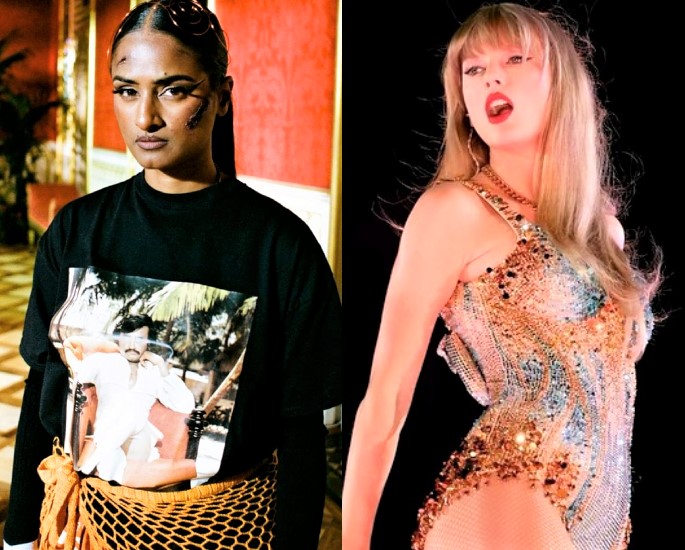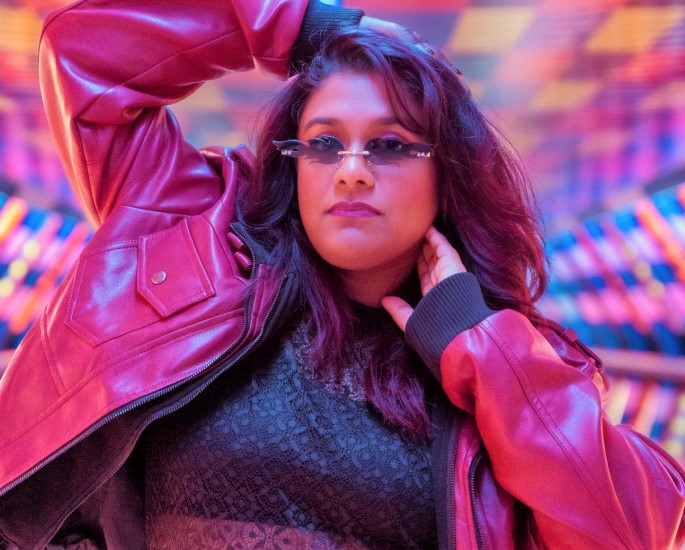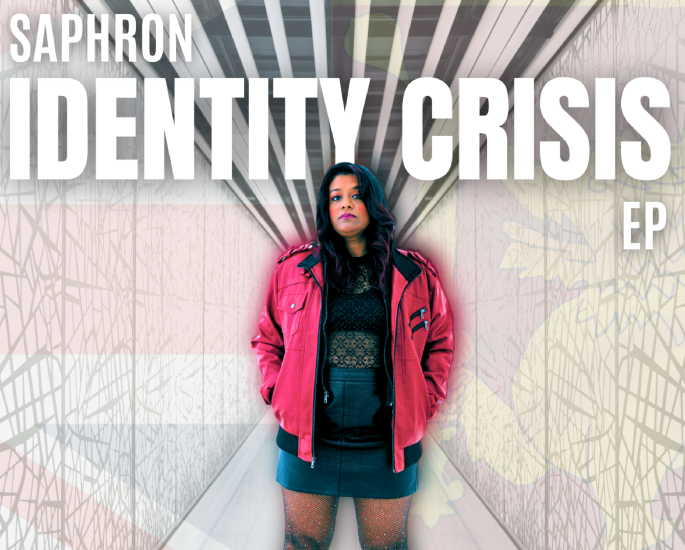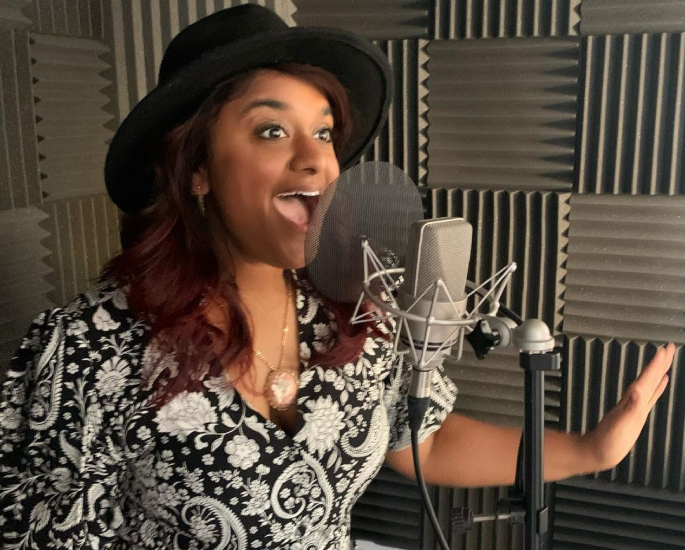"I didn’t feel like there was space for me in the industry"
Saphron is an emerging superstar who is poised to redefine the essence of artistic expression.
As a British Asian, Saphron isn’t just a musician; she’s a storyteller, a boundary-pusher, and an emissary of raw emotion.
For over 10 years, Saphron honed her craft in the shadows, weaving her intricate verses and melodies as a songwriter, garnering over 17 million streams to her credits.
However, a new chapter emerged in 2022 as the musician took centre stage with her voice.
Her soulful tone and echoes of her experiences all culminated into an undeniable force that demanded to be heard, felt, and experienced.
Her journey is fuelled by her Sri Lankan heritage and British roots, giving birth to a symphony of sound that defies expectations.
It’s a recipe that resulted in the artist’s debut track, ‘Nice Try’.
Within the song, Saphron doesn’t just present music; she presents herself, raw and unfiltered.
Through her fearless lyricism, Saphron navigates the corridors of self-discovery and personal growth, inviting us all to unravel our own stories alongside hers.
The release, along with her other popular projects like ‘Walk Through Shadows’ and ‘Lifeline’, showcases the musician’s creative prowess and attention to detail.
But, we wanted to dive deeper into the experienced yet refreshing singer.
So, we caught up with Saphron to speak about her established resume within songwriting, the debut EP and the elements that have impacted her sound.
Growing up, what were your earliest memories of music?

My earliest memories of music are closely tied to my active involvement in school plays and performances, where I discovered my love for singing.
As I developed as an artist, several musicians influenced my sound.
Taylor Swift has been a significant impact on me as a songwriter, inspiring me with her ability to connect emotionally through her music.
I have related to her journey around unpacking notions of ‘goodness’ and being the ‘good girl’.
This was definitely something I experienced growing up as a South Asian in the UK.
It was part of the mask I wore to fit in and appear more ‘British’.
I feel that Taylor’s ability to write to different genres and audiences is something I relate to and continue to challenge myself to do through my music.
Additionally, artists like Billie Eilish, MIA, Pritt, Priya Ragu, and even rock legends like Queen and Nirvana have influenced me stylistically.
They’ve contributed to the eclectic blend of genres and vocal harmony layers that define my musical identity.
How have you evolved from songwriting to releasing your own music?
Over the years, my songwriting journey has been a transformational one.
Initially, I focused on writing for other artists and achieved success here.
I’m so grateful for this experience as I really learned how to craft stories and write lyrics and melodies that took people on a journey.
However, after experiencing racial trauma at work, I quit my job just after lockdown to take some time to work on my mental health.
“My therapist actually suggested that I process some of how I was feeling through my music.”
Through the process of writing, I found my voice and embraced my identity, leading to the release of my debut EP.
Now, I’m fearlessly exploring themes of identity, shadow self, and cultural duality in my music, crafting a distinct musical identity that reflects my personal journey.
What inspired you to fearlessly explore certain themes in ‘Nice Try’?

My debut single ‘Nice Try’ was inspired by a therapy session.
I was in a session talking about some situations where I felt taken advantage of and undervalued.
My counsellor observed that I was obsessed with this notion of ‘goodness’ and being ‘nice’.
Those people-pleasing tendencies were very much a product of my upbringing.
She asked me ‘what would it look like if you were authentic and just said what you wanted to say? What would you want people to know about you?’
Obviously, I wasn’t ready to really say that to people.
So, I channelled that feeling into music which resulted in ‘Nice Try’.
Little did I know back then that this was the catalyst for huge change and healing in my own life, and really finding my voice both personally and artistically.
‘Nice Try’ was very much born out of my journey of self-discovery and breaking free from societal expectations.
Experiencing racism and struggling with my identity as a British Asian artist, I delved deep into my core beliefs and internalised biases.
Racial trauma therapy awakened a desire to find my voice and share my story through music.
I wanted to fearlessly explore the themes of identity and shadow self.
This was so I could offer a voice to those who face similar struggles and encourage them to embrace their duality, just as I have found peace in doing so.
By giving myself a voice, it was almost an act of permission to allow me to show up fully in that way.
It was very much the start of breaking my people-pleasing tendencies and becoming my most authentic self.
How do you approach merging different genres for your sound?
My approach to blending different genres comes from my diverse inspirations and influences.
I draw from various artists, both contemporary and classic, to celebrate their styles through my music while developing my unique sound.
I love experimenting with harmonies and layers.
“It allows me to create a rich and emotionally evocative sonic experience.”
My sound is a reflection of my journey, bridging the gap between my Eastern roots and Western upbringing.
It results in an interesting fusion of rap, trap, and vocal harmonies.
I’m always keen to learn from other people. So, the layers you hear on the track were a collaborative effort with my producer Hardcode.
He was really great to work with as he was up for trying anything.
What do you believe sets your songwriting apart?

I believe what sets my songwriting apart and resonates with a wide audience is the authenticity of my lyrics.
By drawing from my personal experiences and embracing vulnerability, my music becomes relatable.
Additionally, I think the influence I’ve had from listening to a blend of different genres adds lyrical and emotional depth to my songs.
It allows people from different backgrounds to find points of connection.
I think it’s this connection that makes my music accessible to a broader audience.
I really try to focus on writing hopeful music that lifts the listener’s spirit whilst also allowing space for a full range of emotions.
How do you adapt your songwriting for the electronic music genre?
I think the key is really listening to the needs of the producers/DJs.
Writing for other people is a real journey of detaching from the ego and the need to be heard and seen, whilst also crafting a balance of bringing your authentic self to the table.
Sometimes though it’s just persistence and good luck!
I believe whatever song I write, it has a home somewhere with someone, it’s just a matter of figuring out where that is.
“I wouldn’t say I adapt my approach too much.”
I think I’m more conscious of not making the lyrics too personal and more generic so that they can relate to a lot of different people.
With a lot of trance stuff, it is being mindful of writing hopeful, uplifting lyrics with strong metaphors and imagery.
I would say you definitely get to be more poetic in the trance genre so that’s always fun.
Could you elaborate on how you express ‘the shadow self’?

This is a great question!
So when I say ‘shadow self’, I mean the parts of ourselves that we try and hide in order to be perceived in a certain way – the vulnerable, egotistic, ‘bad parts’.
My music explores this concept in that I allow myself to do the opposite of what I’ve been trained to do in real life.
So talk back, be big and witty and sassy.
Growing up in an Asian family, it was very much the notion of be small, be the ‘good’ girl, don’t rock the boat, try and fit in, do as you’re told, be seen but not heard.
But what happens when you turn that on its head and just start to speak up?
Say what you got to say, find your voice, be seen, be loud, be unafraid. My EP was very much that journey.
I gave myself permission to speak and what resulted was the Identity Crisis EP.
I talk about subjects such as consent, and breaking down patriarchal, colonialistic, and misogynist ideology.
What happens when you deconstruct this?
Well for me it was somewhat of an identity crisis. Setting fire to what was and rising from the ashes, like a phoenix reborn.
I actually got a tattoo of a phoenix to commemorate this! Getting a tattoo is somewhat of a rebellious act within itself.
In my songwriting, I explore themes of identity, racial trauma, and internal struggles, giving voice to the parts of myself that were once hidden.
In my performances, I aim to connect with the audience on a deeper level, conveying the emotions and vulnerability in my songs.
By expressing the shadow self through my art, I hope to empower others to confront their own struggles and find strength in embracing their true selves.
How do you infuse your culture and experiences into your songs?
My cultural background and experiences play a significant role in shaping my music and perspective.
I draw from both my Eastern and Western influences, infusing traditional elements and themes into my songs.
For example one of the tracks on the EP called ‘Me & Karma’ has a tabla playing the main beat whilst also having a trappy synth driving the main melody.
“I feel this song really explores the duality of my journey.”
Sound-wise I started the EP with ‘Nice Try’, a very pop, western influence with a little sitar thrown in for good measure.
This represents my journey of internalised self-hatred and the almost rejection of my true self.
Each song explores the fusion deeper and deeper as I go on this journey of self-discovery and self-love.
By the end of the EP – ‘Me & Karma’ is the result of embracing my true self, and fully accepting my duality, and so musically this is reflected in the production and lyrics.
I feel that as a result, I am able to offer a fresh and unique perspective that challenges stereotypes.
My music reflects the complexities of identity, racial challenges, and the beauty of embracing cultural diversity, which in turn I hope will provide a distinct voice in the music scene.
What lessons did you learn from your debut in 2022?

My debut feature was somewhat of an accident.
I remember sending this track as a ‘pitch’ track with the idea that the DJ would get someone else to record it.
They responded by asking me who the vocalist was because they wanted to use the original vocals.
I was both terrified and surprised.
I’d kinda given up on the music thing as I didn’t feel like there was space for me in the industry.
I was filled with so much self-loathing. It was a real wake-up call to not give up.
My biggest lesson from that was to NEVER compare myself to other people.
It’s such a waste of energy because I will never be them and they will never be them.
I’ve stopped comparing myself to other people now and I feel so much happier for it.
Now I just compare myself to who I was previously and I’m always surprised by how much I’ve grown and evolved as a person and as an artist.
I hope I can continue that as I journey once again into the world of being an artist.
With regard to how it has changed my approach to releasing music, now I release music on my own terms at my own pace.
I’ve stopped comparing my journey to everyone else and I can celebrate all the small wins.
Sitting here writing these responses to these wonderful questions feels like a huge win in and of itself because I couldn’t have imagined it a year ago!
So thank you for being interested in my journey and asking such great questions.
I hope that I can inspire other South Asian artists to do the same and not count themselves out just because their journey doesn’t look like someone else’s!
As a female British Asian artist, how do you build a strong presence in the industry?
Great question!
Firstly, I would say I have a small circle of amazing friends and mentors who I surround myself with who keep me sane and in check.
This industry can be so lonely so I made sure to find my tribe and not stay isolated.
I think the next thing is to be mindful of not comparing yourself to others.
I think all of us have value and worth and don’t sweat it if people don’t get my music.
“I’m not a one size fits all, so not everyone will like what I do and that’s ok!”
I’m going to find my fan base and tribe and that also means I’m gonna come across people who don’t like me. And well that’s their prerogative.
With regard to promoting my music, Carrie Grant (The Radio/TV presenter) gave me some great advice.
She said to me, knock on every door, the ones that open go through because it might just open a door to the next opportunity.
Don’t despise the doors that don’t make sense, you might just find what you’re looking for in a place you weren’t looking at.
Since then I’ve taken that approach, sending and promoting my music wherever and whenever I can.
Eventually, a door will open that opens another one, and another one, and so on.
I try not to get discouraged. When I do, I take a break, rest, refuel and try again. It’s worked so far!
That inner circle tribe is always good for when I need a good pep talk!
Collaborating with like-minded artists and seeking opportunities for exposure in diverse music circles has also been instrumental in growing my presence and reaching wider audiences.
My song ‘Consent’ has a rap on it with the amazing BEKAH who is an upcoming rapper, making waves in the indie music scene right now.
What projects can fans look forward to?

I still have a lot of features coming out this year and my EP is scheduled for release in October 2023 so lots coming for the fans!
Fans can look forward to more music that continues to explore themes of identity, self-discovery, and embracing duality.
I aim to release captivating tracks that blend genres as I really love merging genres.
My hope is that through my music, my fans can find solace, empowerment, and a sense of connection.
I want my listeners to take away a message of self-acceptance, courage, and the importance of embracing one’s true self unapologetically.
Saphron’s artistry is a fusion of genres, a testament to her unyielding commitment to her craft.
With each lyric and beat, she unveils a world where rap becomes poetry and trap is an anthem of empowerment.
Yet, Saphron’s music is more than notes and rhythms; it’s a bridge between cultures.
Her journey to redefine South Asian artistry within the UK charts a course of audacity and innovation.
So, as Saphron continues her upwards trajectory, fans and musicians alike are excited to see what the musician has in store.
Listen to more of Saphron here.






























































